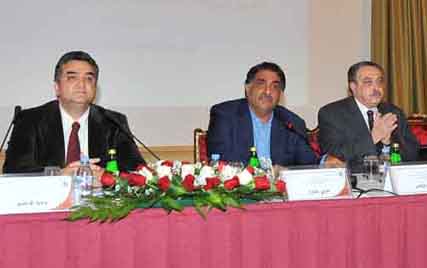
ACRPS Director General Dr Azmi Bishara opened the meeting with a number of comments describing the importance of the event to the Center and its priorities. "We might not be a political movement, but we are concerned with the social realities which Arab countries face." Dr Bishara went on to address the complexity of the sectarian reality which Arab countries face, and which were a possible source of social dissatisfaction:
"We are not naïve. We can not claim to be surprised by the fact that [Arab societies] have their own social composition. We all also understand that the nation-states of the region have not been able to do away with this. "
"Democracy is based on the principle that sovereignty and citizenship are two faces of the same coin", said Dr Bishara. At the same time, Dr Bishara continued, tribalism, sectarianism and other pre-modern forms of identity would make it difficult for Arab states to complete the transition to democracy.
Speaking after Dr Bishara as part of the same panel were Dr Wajih Kansoo, a lecturer in Muslim-Christian relations at Lebanon's Universite Saint-Joseph, and Samir Murqus, the Deputy Mayor of Cairo. Dr Kanso spoke about the potential for positive change which the presently underway revolutions gave for a transition to democratic, modern societies within the Arab countries, while pointing out that "the changes of regime and the toppling of their leaders "did not in itself constitute a change" in societal terms.
Samir Murqus followed with a detailed discussion of the events of the Egyptian revolution, and focused particularly on relations between Coptic and Muslim Egyptians. While the Coptic community was at the forefront of the revolution, Murqus made reference to a number of incidents which followed the change of regime which did not bode well for the birth of a non-sectarian polity in Egypt.
During the second panel, which was chaired by Qatari author Abdulaziz Al Mahmoud, ACRPS researcher Dr Jamal Barout spoke of the creation of a "false sectarian consciousness" in the Arab Levant. Dr Barout pointed to how French colonial policies which dated back to the birth of the Silk trade in Mount Lebanon, gave prominence to divisions between various communities living within the borders of what became Syria and Lebanon. After Dr Barout's historical survey of the state of affairs in Syria, QFIS lecturer Dr Mohammed Al Shenqeeti spoke of the history of the change in Sunni-Shia relations, drawing unfortunate parallels between the situation of medieval Baghdad and the situation following the American invasion of 2003; this brought the meeting back to a statement made by Dr Bishara in his opening remarks, when speaking of the sectarian divide which was institutionalized by the first post-2003 American governor of Iraq, Paul Bremmer, "His crime was not a small one: he created the [sectarian divide] in Iraq."